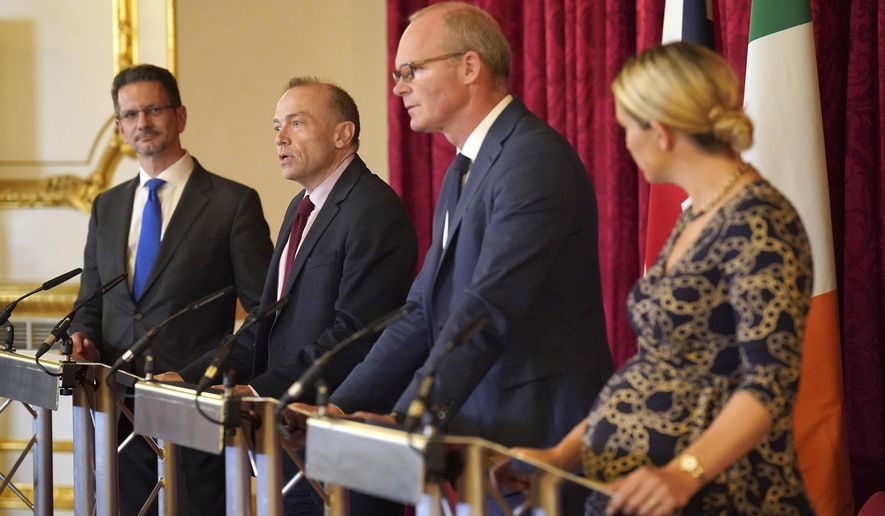LONDON (AP) — Britain and Ireland hailed a new spirit of compromise on Friday in a grinding feud over post-Brexit trade rules, expressing hope of making enough progress in the next three weeks to avoid a destabilizing new election in Northern Ireland.
It comes as new British Prime Minister Liz Truss seeks to improve relations with the U.K.’s neighbors after the country’s long, acrimonious divorce from the European Union.
U.K. Northern Ireland Secretary Chris Heaton-Harris said Britain and the EU were negotiating “in good faith and good humor” - a marked contrast from the bitter tone that has marred relations since the U.K. voted for Brexit in 2016.
Speaking to reporters in London after a meeting of the British-Irish Intergovernmental Conference, he said he was “very positive about the chances of getting a negotiated solution.”
Irish Foreign Minister Simon Coveney said “political leadership is about making things happen and sometimes surprising people, and I think that’s what we need to do over the next few weeks.”
Arrangements for Northern Ireland - the only part of the U.K. that shares a border with an EU member, which is Ireland - have been the most contentious issue so far in the U.K.-E.U. divorce, which became final at the end of 2020.
The two sides agreed to keep the Irish border free of customs posts and other checks because an open border is a key pillar of the peace process that ended decades of violence in Northern Ireland. Instead, some goods entering Northern Ireland from the rest of the U.K. undergo checks.
That solution has spiraled into a political crisis for the power-sharing government in Belfast, with British Unionist politicians refusing to form a government with Irish nationalists because they see the checks as undermining their British identity and Northern Ireland’s place in the United Kingdom.
Earlier this year, with talks to solve the problem gridlocked, Britain introduced legislation to suspend the checks and rip up part of its legally binding Brexit treaty. The unilateral move brought legal action from the EU and the risk of an all-out trade war.
But Russia’s invasion of Ukraine has put Brexit in perspective, brought European allies closer together and given the U.K. and the EU new motivation to heal their divide. U.K. and EU negotiators this week held their first talks in months.
Neither side has set a deadline, but one date looms: If the Northern Ireland executive is not up and running by Oct. 28, a new election must be held, bringing yet more uncertainty.
Coveney said the aim was to make enough progress before Oct. 28 to persuade North Ireland’s unionists to rejoin the Belfast executive.
“I don’t think we can get everything agreed in the space of three weeks, that is completely unrealistic,” he said. “But the question is can we make progress that is measurable and serious in that period where people can see we’re on a course that the people can start believing in.”
Beyond that, April 2023 marks 25 years since the Good Friday Agreement, the peace accord that largely ended three decades of violence in Northern Ireland. Politicians in the U.K., Ireland and the U.S. - which played a key role in negotiating the agreement - all want to resolve the trade issues before the anniversary.
Still, there is no outward sign that the U.K. is willing to scrap its treaty-breaching legislation, a key EU demand.
Coveney nonetheless struck a positive note.
“What we’re after here is a nil-all draw, where everybody can walk away feeling that they haven’t won or lost, but they can live with the outcome,” he said.




Please read our comment policy before commenting.